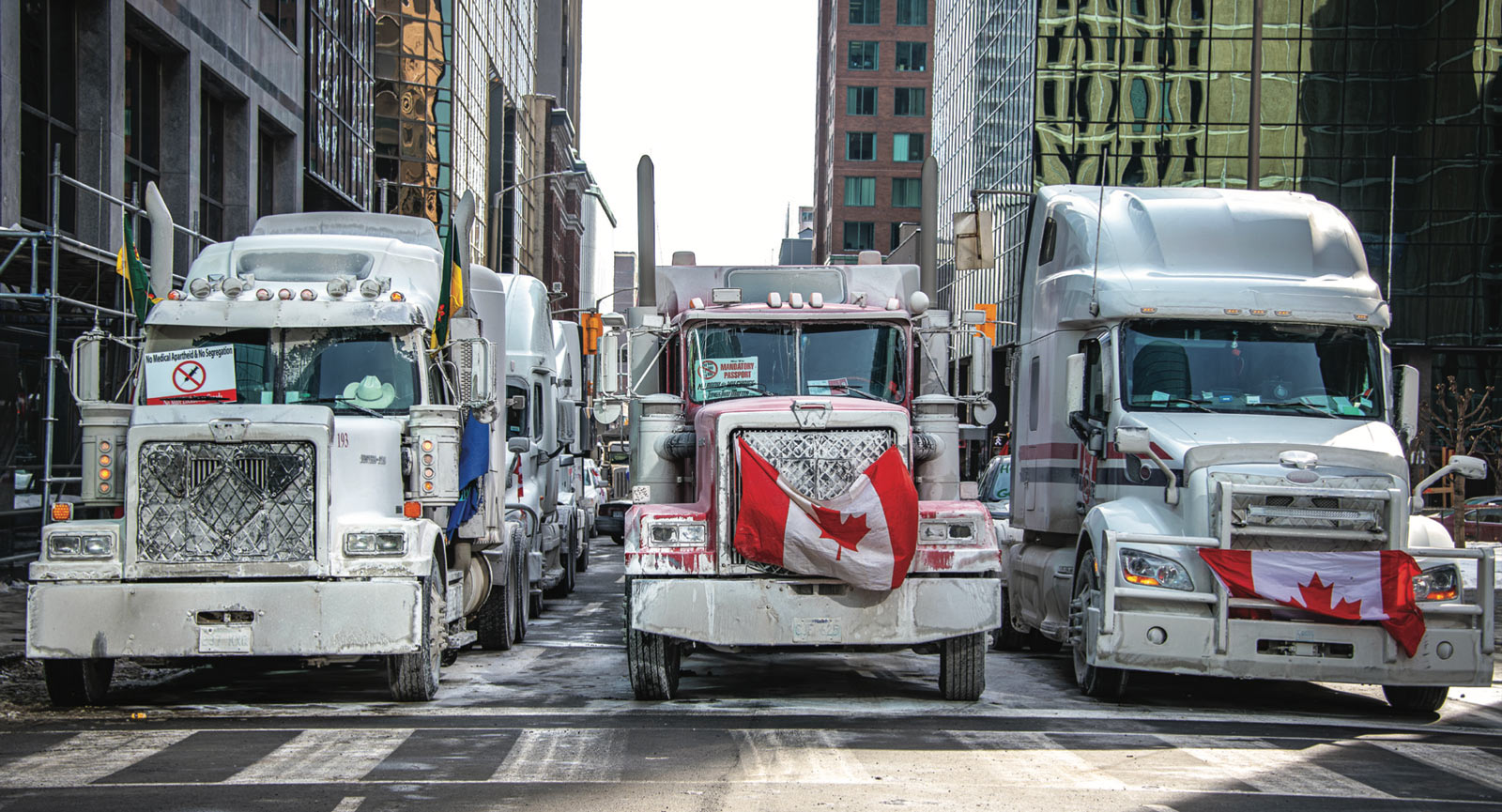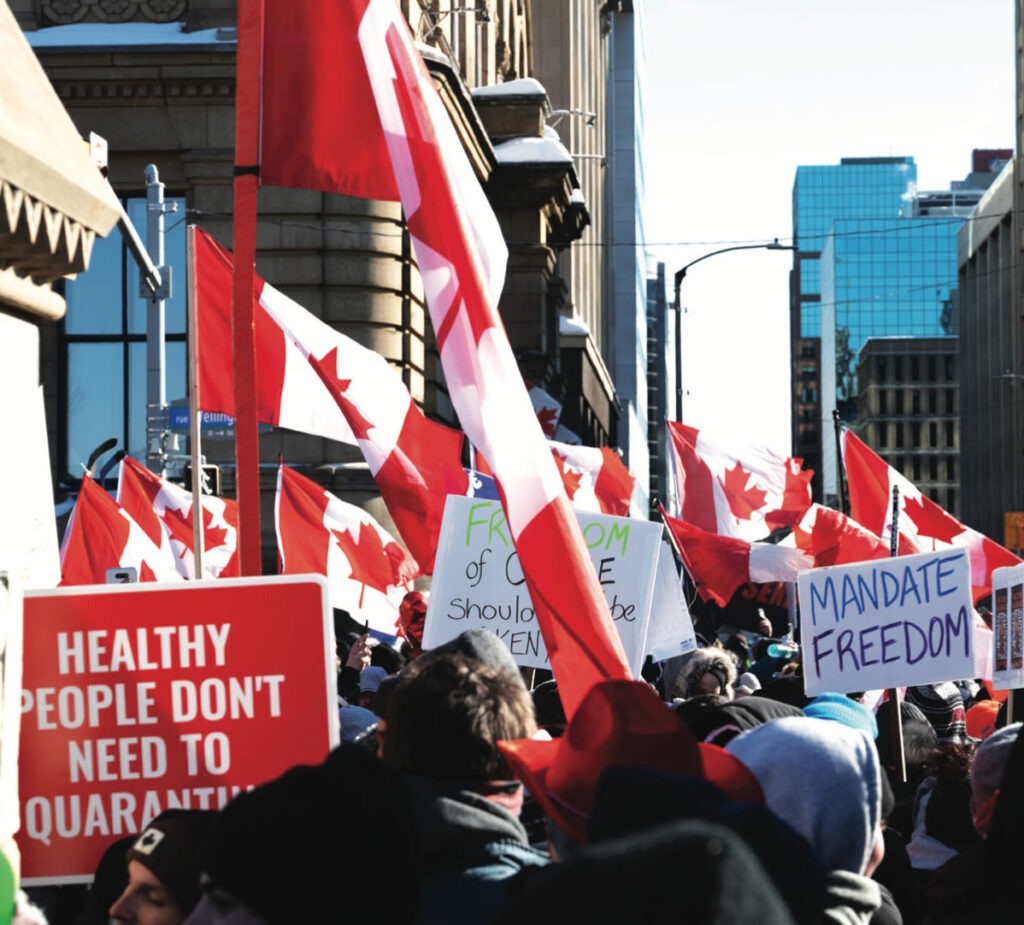The Bouncy Castle, the Hot Tub and the Besieged Capital: The Politics of Public Order

This post-pandemic winter will be fraught with — amid a glut of less lofty propaganda — Richard III references about discontent. For Canadians, some of that discontent will arise from the reanimation by the Public Order Emergency Commission of last winter’s debates over the blockades of the capital and key border crossings. Director of the Dalhousie University School of Public Administration Lori Turnbull weighs the odds of that process changing dreadful marches to delightful measures.
Lori Turnbull
Perhaps even more so than usual, the tone and content of debates in the House of Commons for the coming months will be affected by events and proceedings occurring outside its walls.
Specifically, the Public Order Emergency Commission is tasked with producing a report on whether the federal government’s use of the Emergencies Act in response to what has become known as the “freedom convoy” was legitimate.
The Liberal government will insist that the emergency power was justified and necessary to restore order in areas where blockades were disrupting business and community life, including in the parliamentary precinct. Critics – including a Conservative Party now led by convoy supporter Pierre Poilievre – will claim that the government overstepped with the purpose of silencing “protesters” who dared take issue with COVID-19 restrictions related to vaccines, masks, and travel.
The debate will come to a head next spring, when the Commission’s report delivers a judgment on whether the Liberals were in the right. If the report raises any doubt about the propriety of the federal government’s actions, it would give the Conservatives an opportunity to bring forward a motion of non-confidence in the government.

Given Poilievre’s support for the blockaders during his leadership campaign, he would face pressure to hold the government to account with every tool at the opposition’s disposal. That said, if such a motion were to pass and an election were called, Poilievre could find himself with a disappointing result at the polls – particularly if he remains as polarizing a figure as polls show him to be now.
To be clear: the Commission’s proceedings are not going to grip the country. Even in dramatic moments such as testimony from Prime Minister Justin Trudeau and former Ottawa police chief Peter Sloly, it is unlikely that we will learn much in the way of new facts. There will probably not be a “gotcha” moment that would cause a shift in public opinion or create a new conversation.
Instead, the testimony will likely consist mostly of details and descriptions we have already heard. Politicians’ accounts will be largely rhetorical in nature and this will carry over into parliamentary debates and televised political panels. Regardless of the findings of the report, the government will use the Commission’s proceedings as an opportunity to tell their story about the severity of the consequences of the blockades of both the nation’s capital and border crossings both for the economy and for public safety.
The Conservatives will likely portray the government as overreaching, intolerant of criticism, and disrespectful towards anyone who does not support their political agenda. They will say that Trudeau’s empathy does not apply to everyone. It will be a battle of narratives that goes far beyond the circumstances of the blockades and the government’s response. Ultimately, the Commission’s proceedings and the testimony that it hears will become fodder for political parties as they struggle to connect with voters before the next election.
Ostensibly, the blockades started out as a protest among truckers who objected to mandatory vaccines for those crossing the Canada-US border. This was never the real story, of course, as over 90 percent of professional truckers were fully vaccinated. But as trucks big and small rolled toward Parliament Hill from across the country, the movement became more complex in its purpose and identity.
Participants and sympathizers were motivated by a range of COVID-related issues, including vaccine mandates, masking requirements, business closures, and social distancing rules. The blockaders claimed to be deeply resentful of what was portrayed as sustained and unjustified government intrusion in the lives of Canadians via public health mandates during the pandemic.
The blockaders’ apparent anger at the Trudeau government — amid the unprecedented protest props of hot tubs, blaring music and a bouncy castle inflated at the foot of Parliament Hill — was matched by the anger of citizens and business owners who remain traumatized by memories of constant horns and fear of walking the streets. The Canadian flag was appropriated by occupiers of the capital city and waved alongside obscenity-filled signs bearing the prime minister’s name.
The unprecedented events of the blockades suggest a divide in Canadian politics, one that parties are all too eager to exploit. There is ample survey data to indicate that such a divide exists, though it is not clear whether it will endure. Both Trudeau and Poilievre have been accused of fanning the flames of wedge politics to solidify political constituencies around them at the expense of national unity or a sense of common project.
Leader-centrism further exacerbates “for or against” politics by putting the emphasis on the leaders rather than parties, which tend to share at least some values that can be used to build bridges and find common ground.
None of this bodes well for parliamentary proceedings this fall. The leaders of the two largest political parties are polarizing in their own right and have a lot to prove. Poilievre is trying to overcome this and build broader public appeal by talking about pocketbook issues that often seem to escape the attention of the Liberals. However, if the Commission’s report finds that the threshold for the Emergencies Act was not met, Poilievre will face pressure to put his money where his mouth has been with respect to the “freedom convoy.”
After all, his alliance with its participants and supporters helped him to win the leadership. Convoy participants donated over $460,000 to the Conservative leadership race, 70 percent of which went to Poilievre. However, it could be a risky business to force an election on the Liberals’ use of the Emergencies Act, even if the report raises issues with it. Most Canadians do not support the blockaders or their tactics.
Of course, whether the Liberals are defeated on a confidence motion is up to Jagmeet Singh and the New Democrats. They will have to determine whether an early end to the confidence and supply agreement with the Liberals is the best way forward for them, which will depend largely on whether the key promises of the agreement have been achieved by then and whether the NDP feels in a position to take any credit for the results.
They also need to weigh the possibility that a 2023 election could result in a plurality of seats for Poilievre and the Conservatives, particularly if the Trudeau brand is further tarnished by then and Poilievre has found ways to resonate in key ridings. If this is the case, and Singh is not willing to prop up a Poilievre minority, an early election would be a bad move.
Meanwhile, the Liberals’ minds are elsewhere. They are more focused on Canada’s place in the world rather than on domestic political irritants. The Liberals’ approach to policy, governance, and priorities has always been based on their sense of virtue. Now that they are in their third mandate and feel that they can boast of virtuous governance on a list of domestic issues, including childcare, pension reform, and economic aid during COVID, they are now shifting their attention to doing the same abroad. Deputy Prime Minister Chrystia Freeland is promoting a world order that separates state actors into two camps: liberal democracies and autocracies (read: good guys and bad guys).
In a recent speech to the Brookings Institution in Washington, Freeland said: “I’m now proposing that the only way for us to do well is to do good.” By that she means that we must align ourselves with trading partners who share our values, reject those who don’t, and come to the rescue of allies who need assistance. But this is where the dichotomy between global and domestic politics is exposed for the falsehood it is: if Canada is to participate meaningfully in this new global arrangement, it will be costly and require a rethink of our reliance on traditional approaches to trade relationships. As Heather Scoffield has observed in the Toronto Star, the economic implications of this global reset would be felt by Canadian sectors, businesses, and citizens.
If the Liberals plan to win another mandate (and obviously they do, whether Trudeau stays on as leader or not), they risk not taking Poilievre seriously enough as a threat. They are giving the Conservatives and the NDP too much opportunity to resonate on bread and butter issues. To stay competitive, the Liberals need to explicitly reconcile their global agenda with domestic realities. This will require clear communication at home, both within and outside Parliament. Otherwise, the other parties could see mutual advantage in bringing the government down next spring.
Contributing Writer Lori Turnbull, co-winner of the Donner Prize for Political Writing, is an Associate Professor and Director of the School of Public Administration at Dalhousie University.
